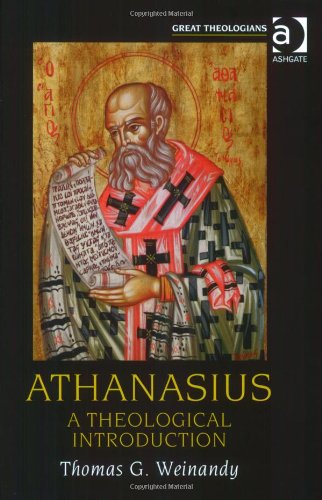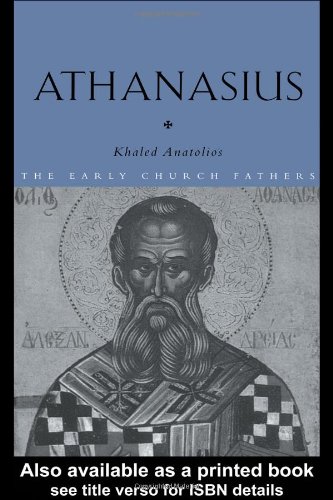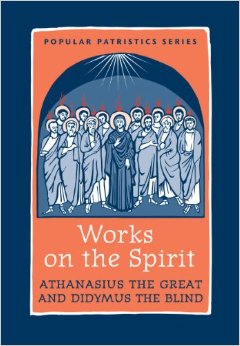|
Relevant
books available at Amazon
Many Athanasius
studies
and translations with links to Amazon
--------------
STUDIES (Click on images below.)
 
Athanasius of Alexandria
David M. Gwynn --------------
 
Athanasius
Peter J. Leithart --------------
 
Athanasius: A Theological Introduction
Thomas G. Weinandy --------------
TRANSLATIONS
 
Athanasius
Khaled Anatolios --------------
 
On the Incarnation
John Behr --------------
 
Works on the Spirit
Mark DelCogliano et al. --------------
 
The Life of Antony and the Letter to Marcellinus
R. C. Gregg -------------- |
They have fabricated books which they call books of tables, in which they shew
stars, to which they give the names of Saints. And therein of a truth they have
inflicted on themselves a double reproach: those who have written such books,
because they have perfected themselves in a lying and contemptible science; and
as to the ignorant and simple, they have led them astray by evil thoughts
concerning the right faith established in all truth and upright in the presence
of God.
But since we have made mention of heretics as dead, but of ourselves as
possessing the Divine Scriptures for salvation; and since I fear lest, as Paul
wrote to the Corinthians, some few of the simple should be beguiled from their
simplicity and purity, by the subtilty of certain men, and should henceforth
read other books—those called apocryphal—led astray by the similarity of their
names with the true books; I beseech you to bear patiently, if I also write, by
way of remembrance, of matters with which you are acquainted, influenced by the
need and advantage of the Church. In proceeding to make mention of these things,
I shall adopt, to commend my undertaking, the pattern of Luke the Evangelist,
saying on my own account: ‘Forasmuch as some have taken in hand,’ to reduce into
order for themselves the books termed apocryphal, and to mix them up with the
divinely inspired Scripture, concerning which we have been fully persuaded, as
they who from the beginning were eyewitnesses and ministers of the Word,
delivered to the fathers; it seemed good to me also, having been urged thereto
by true brethren, and having learned from the beginning, to set before you the
books included in the Canon, and handed down, and accredited as Divine; to the
end that any one who has fallen into error may condemn those who have led him
astray; and that he who has continued stedfast in purity may again rejoice,
having these things brought to his remembrance.
There are, then, of the Old Testament, twenty-two books in number; for, as I
have heard, it is handed down that this is the number of the letters among the
Hebrews; their respective order and names being as follows. The first is
Genesis, then Exodus, next Leviticus, after that Numbers, and then Deuteronomy.
Following these there is Joshua, the son of Nun, then Judges, then Ruth. And
again, after these four books of Kings, the first and second being reckoned as
one book, and so likewise the third and fourth as one book. And again, the first
and second of the Chronicles are reckoned as one book. Again Ezra, the first and
second are similarly one book. After these there is the book of Psalms, then the
Proverbs, next Ecclesiastes, and the Song of Songs. Job follows, then the
Prophets, the twelve being reckoned as one book. Then Isaiah, one book, then
Jeremiah with Baruch, Lamentations, and the epistle, one book; afterwards,
Ezekiel and Daniel, each one book. Thus far constitutes the Old Testament.
Again it is not tedious to speak of the [books] of the New Testament. These are,
the four Gospels, according to Matthew, Mark, Luke, and John. Afterwards, the
Acts of the Apostles and Epistles (called Catholic), seven, viz. of James, one;
of Peter, two; of John, three; after these, one of Jude. In addition, there are
fourteen Epistles of Paul, written in this order. The first, to the Romans; then
two to the Corinthians; after these, to the Galatians; next, to the Ephesians;
then to the Philippians; then to the Colossians; after these, two to the
Thessalonians, and that to the Hebrews; and again, two to Timothy; one to Titus;
and lastly, that to Philemon. And besides, the Revelation of John.
These are fountains of salvation, that they who thirst may be satisfied with the
living words they contain. In these alone is proclaimed the doctrine of
godliness. Let no man add to these, neither let him take ought from these. For
concerning these the Lord put to shame the Sadducees, and said, ‘Ye do err, not
knowing the Scriptures.’ And He reproved the Jews, saying, ‘Search the
Scriptures, for these are they that testify of Me’ But for greater exactness I
add this also, writing of necessity; that there are other books besides these
not indeed included in the Canon, but appointed by the Fathers to be read by
those who newly join us, and who wish for instruction in the word of godliness.
The Wisdom of Solomon, and the Wisdom of Sirach, and Esther, and Judith, and
Tobit, and that which is called the Teaching of the Apostles, and the Shepherd.
But the former, my brethren, are included in the Canon, the latter being
[merely] read; nor is there in any place a mention of apocryphal writings. But
they are an invention of heretics, who write them when they choose, bestowing
upon them their approbation, and assigning to them a date, that so, using them
as ancient writings, they may find occasion to lead astray the simple.
|

